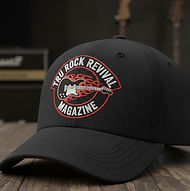
DAVE NAVARRO
Interview with Dave Navarro
Former Jane’s Addiction guitarist, sonic innovator, survivor.

July 2025 By Kreig Marks
Kreig: Dave, you've always been known as someone who blends the sensual and the cerebral in your music. What’s been inspiring you lately?
Dave: Lately? Silence. Honestly. After decades of noise and chaos, I find inspiration in stillness. But also, Japanese ambient music, classic horror scores, and heartbreak. That last one’s a lifelong muse.
Kreig: Classic horror scores. Interesting but cool too. Your guitar tone is iconic, otherworldly, raw, and emotional. How do you shape that sound?
Dave: It starts with pain. That’s the first filter. Then I layer on effects like you’d put on armor. It’s less about gear and more about what emotional state I’m channeling when I plug in.
Kreig: Let’s talk Jane’s Addiction. The chemistry you had with Perry Farrell was undeniable, but lately, that chemistry seems… volatile. What actually happened on stage during that amplifier incident?
Dave: Yeah, that night... it wasn’t our proudest moment. Perry got frustrated because my amp was louder than he expected; it was a miscommunication, not an act of defiance. But emotions were high, and he reacted physically. I didn’t retaliate. I chose to step back because, honestly, it felt like we were falling into old patterns. We’ve both grown, but maybe not enough in the same direction.
Kreig: So, do you and Perry still have a relationship now, after that altercation?
Dave: “Relationship” is a strong word. We’ve exchanged texts, mostly civil. But no, we’re not talking regularly. We’ve always been like volatile elements, brilliant together when it clicks, explosive when it doesn’t. I wish him peace, truly. But I need space.
Kreig: Looking back, do you think Jane’s Addiction was more of a band or a beautiful disaster?
Dave: Beautiful disaster is generous. It was both a revolution and a train wreck. But that’s what made it magnetic. We weren’t supposed to be safe or polished. We were supposed to be felt.
Kreig: What do you miss most about the early Jane’s days?
Dave: The sense that anything was possible. That punk, funk, metal, and psychedelia could all live in one body. Before egos and expectations got involved. Just raw creation.
Kreig: Is there a part of you that still wants to make peace with Perry, artistically or personally?
Dave: Part of me does. But peace takes two willing hearts. I’m open to a conversation, but it has to come from respect, not nostalgia or obligation. We’ve both seen too much to pretend anymore.
Kreig: You’ve played with Jane’s, RHCP, and solo. Where did you feel most yourself?
Dave: Solo. Not because I’m a control freak, but because I could express the darkest, strangest parts of myself without compromise. With Jane’s, I was a contributor. On my own, I’m the canvas.
Kreig: You’ve been open about your battles with addiction and trauma. Has music always been your form of therapy?
Dave: Music is the only language I’ve ever trusted. Talking helps, sure, but playing is where I bleed. It doesn’t judge. It doesn’t fix you. It just absorbs.
Kreig: Do you think Jane’s Addiction has one last great album left in it, or is that chapter closed?
Dave: If we could leave egos at the door, maybe. But that’s a big if. Right now, it feels like that book’s on the highest shelf. I’m not reaching for it anymore. But who knows?
Kreig: If Perry reads this interview , what would you want him to know?
Dave: That I never turned up my amp to drown him out. It wasn’t about ego, it was about energy. And that I hope he finds his center again, wherever that is. I’m still here, just... at a distance.
Kreig: What’s next for Dave Navarro? More music, art, or something entirely unexpected?
Dave: All of it. I’ve been painting more, writing, even exploring scoring for film. The past doesn’t define me. It shaped me, sure, but I’m still creating. Still healing. Still plugged in.





